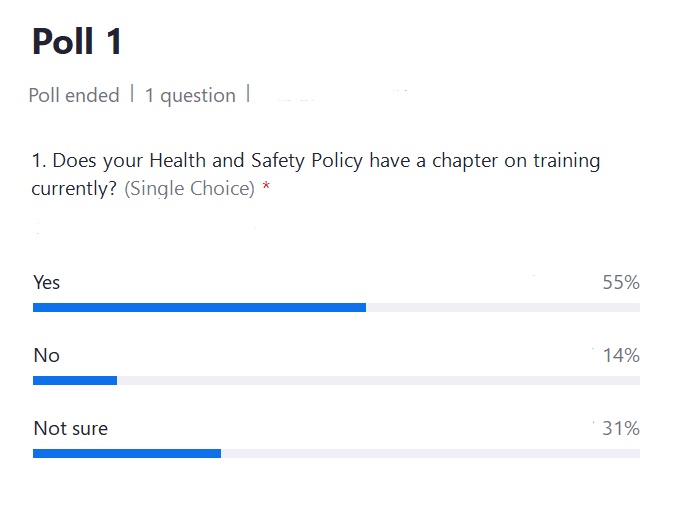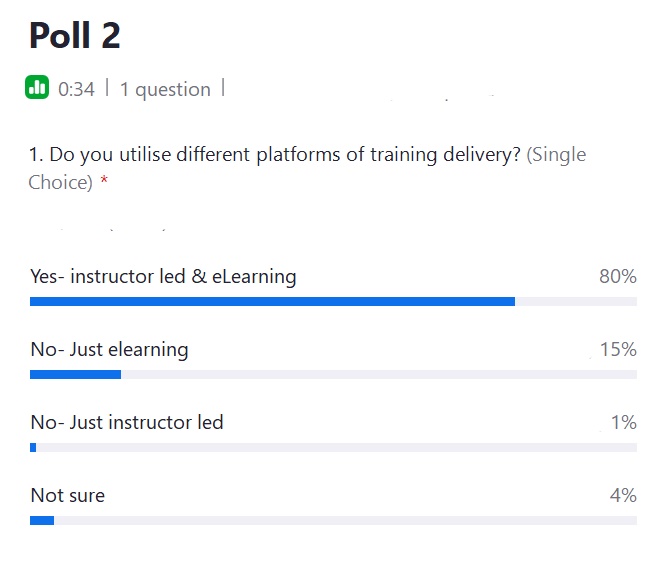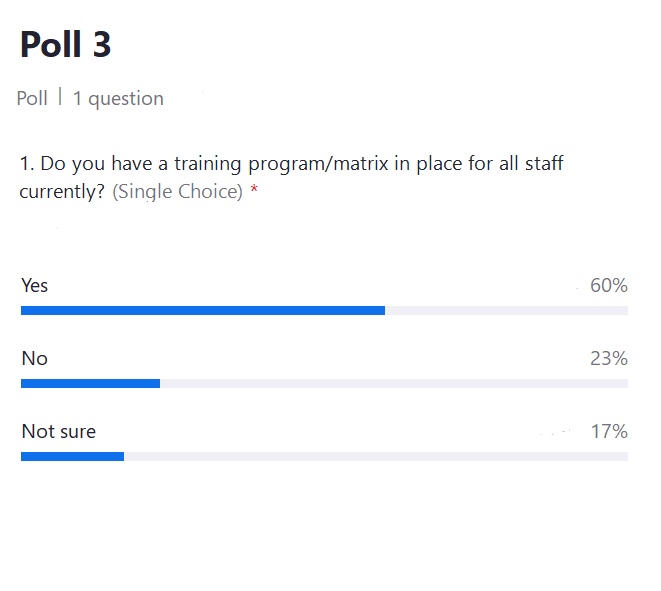What Does a Good Compliance Training Programme Look Like?

This session focused on: clarifying the essential training requirements to maintain legal compliance and implement best practice; how to identify specialist areas and specific training needs; and implementing a rolling training program to identify training formats and refresher periods.
Poll 1

- Ensure people who work for you know how to work safely and without risks to health.
- Develope a positive health and safety culture, where safe and healthy working becomes second nature to everyone.
- Meet your legal duty to protect the health and safety of your employees.
Deciding what training your School or Trust needs and your training priorities
Always start with your central policy. Your Health and Safety Policy should set out how you will comply with relevant legislation by ensuring suitable training is provided for each defined job role with relevant compliance-related responsibilities.
This works in conjunction with each risk assessment you and your colleagues write for every activity, task and area of the school.
Through the policy and risk assessment information, you will carry out a Training Needs Assessment that identifies which job roles require which training course and at what frequency.
Legal obligations:
All staff should receive appropriate health and safety training. We support clients to provide every staff member with H&S, Fire, Manual handling, WAH and stress management via eLearning as the core requirement to cover all common hazards and safety awareness.
Those with delegated responsibilities must have suitable training for that role. This includes:
-
Trust Compliance Leads, Head Teachers/Executive Heads and Senior Leaders: The Senior Leadership must clearly understand overall compliance requirements within their school or Trust. This will include the legal requirements for managing health, safety and fire, personal responsibilities, delegating to team members and implementing a health and safety management system.
- Business Managers/Bursar/H&S Lead: A nominated team member who takes the role of Health and Safety Lead on behalf of the Head Teacher/Principal (Or it may be the Head Teacher in a small school) needs to be provided with suitable management level training to understand the day-to-day management of health, safety and fire in a school. This will include risk assessment, managing suitable controls, accident investigation and working with other teams on preventative maintenance and high-risk subjects.
- Practical Department staff (including technicians): These staff members will have some of the most specialist requirements regarding training, which will range across a wide scope of disciplines.
- Some examples include: P.E staff training on a new climbing wall, Science training on radioactive sources, and D&T staff training on a gas-powered forge or Art staff using an electric kiln safely.
- The key point for practical departments is recognised specialist support from approved bodies. CLEAPSS for Science, DATA for Technologies, AfPE for P.E and NSEAD for Art.
- NB: Not only will practical departments need specialist training, but often have the need for a higher level of manual handling and work-at-height training depending on the equipment they are using, e.g., drama has a Tallescope to access lighting, and science has a step ladder in a chemical store.
- Fire Wardens: Nominated fire wardens are given additional responsibilities, which you are required to train them in. Providing suitable instruction and training for this role is key to ensuring they follow the right procedures in an emergency.
- This starts with fire warden training (eLearning is sufficient for smaller sites while more complicated sites should consider instructor-led training).
- If they assist colleagues with personal emergency evacuation plans for staff or pupils, inspectors expect to see a record of training briefings provided to go through the required plans.
- NB: If your school has evacuation equipment such as evac chairs or rescue sledges, these require specific in-person training before use.
- Premises Staff: Premises teams come with a wide range of subjects that may apply to your building. The most common areas for in-person, instructor-led training are Legionella management, asbestos awareness, work at height that includes ladders, manual handling, hazardous substances (COSHH), Managing Contractors and work equipment/electrical equipment.
- Refresher training can be provided through online learning but due to the risk level associated with their role, instructor-led training is recommended for initial courses.
- Educational Visit Coordinators: EVC’s are nominated members of staff who will complete a quality check on all trip plans, risk assessments, staff requirements, etc. for education visits. This can be a member of the support team or the Head Teacher, depending on the size of the school.
- NB: The Department for Education has clarified that whilst it is not a legal requirement to have a trained, nominated EVC in place, it is an expectation, and by training an EVC, you will be able to monitor and manage all plans that Trip Leaders produce, including emergency planning, risk assessment, first aid and medicines, etc.
Poll 2
Choosing your training methods
A big part of deciding which training method to use can depend on the team or individual concerned, as everyone learns differently.
When you have several core courses to get out to every member of staff, eLearning is a great method as you can issue it to everyone at once. They can then complete it at a pace or time that suits them.
However, not everyone learns well remotely or from a screen, so you may find some staff members would benefit from an in-person training course. Alternatively, you can also try having a member of the SLT sit down with the employee to support them as they complete the eLearning course. Also, group safety briefings can be great for this to have everyone in discussion together on an inset day.
Some subject areas need to be in-person such as when there is a new subject or the learner hasn’t had direct instruction on the topic previously.
Manual Handling is a good example where a trainer needs to be confident that a Premises Manager has received in-person instruction on how to plan and lift/move heavy items safely. Also, the detail of asbestos awareness being discussed in person to ensure a clear understanding of what must be recognised in their own building.
Where staff briefings are sufficient, e.g., on the best practice of cleaning up biological hazards or managing trip hazards in schools, Toolbox Talks can be considered as a recordable way of providing staff briefings in team meetings. Judicium have a library of Toolbox Talk templates that are automatically available to our Health and Safety clients to utilise. They are a great tool to use to refresh staff on safe working practices following an accident or incident.
Poll 3
Plan a refresher schedule for ALL staff
The Management of Health and Safety at Work Regulations 1999 identifies situations where health and safety training is particularly important:
- When people start work
- Safety induction with core training
- On exposure to new or increased risks
- Specialist roles that require additional knowledge to work safely
- Where existing skills may have become rusty or need updating
- Ongoing management of hazards to ensure legislation, guidance and best practice updates are provided and implemented.
For refresher training, there are no set specific timescales in law. It is a risk-based approach determined by the staff involved, the risk level of the activity concerned and whether there have been any factors to warrant earlier renewal of training, e.g., an avoidable accident.
Instructor-led courses can often move to eLearning refresher training for a few years before repeating the instructor-led course to maintain competency.
Example:
Work at height training
- Most of your staff will not be required to carry out high-risk work at height tasks and so need to be made aware of safe practices for low-risk occasional tasks such as changing display materials or getting something out of storage. This can be in the form of an eLearning course and then refreshed every two years unless an event occurs that warrants an earlier refresher.
- Premises staff will be required to carry out high-risk work at height, including ladders, access to roof areas, or hiring equipment such as cherry pickers. This would warrant an instructor-led course providing training on risk-assessing work and safely using the relevant access equipment.
- For the lower end of work at height training, e.g., step ladders and leaning ladders, this can then be refreshed on an annual basis through eLearning platforms until it is determined that a full instructor-led course is required again.
- For higher-risk activities such as using cherry pickers or mobile towers, this training holds an average five-year refresher period with a specialist trainer, e.g., PASMA and IPAF.
Key Points to Take Away:
-
Your Health and Safety Policy defines which job roles require what training.
-
Create and implement a training program across all your teams.
-
Ensure suitable refresher training is provided at relevant periods.
Additional Info:
The Health and Safety Service is also providing accredited training courses, including eLearning with specific modules ranging from courses designed for premises managers and SLT to all staff offerings and fire warden training: https://www.judiciumeducation.co.uk/elearning
We also offer live, exclusive training options https://www.judiciumeducation.co.uk/training
To review Judicium’s forthcoming sofa sessions please click here.
Follow us on Twitter - @JudiciumEDU
© This content is the exclusive property of Judicium Education. The works are intended to provide an overview of the sofa session you attend and/or to be a learning aid to assist you and your school. However, any redistribution or reproduction of part or all of the contents in any form is prohibited. You may not, except with our express written permission, distribute or exploit the content. Failure to follow this guidance may result in Judicium either preventing you with access to our sessions and/or follow up content.
Related content
.png)
This blog is based on Judicium’s Health and Safety ‘Sofa Session’ from the 7th January 2026, with our resident expert Jamie Ashard CMIOSH. This session focused on Common key stressors in the education sector, Applying the 6 key HSE management standards for stress, Completing a stress risk assessment and implementing practical solutions.
.png)
This blog is based on Judicium’s Health & Safety and SEND session on 26th November with resident expert India Cottenden
.png)
This blog is based on Judicium’s Food Safety Sofa session on 12th November with resident experts Sue Roberts and Tracey Killick

This blog is based on Judicium’s Health and Safety ‘Sofa Session’ on the 15th of October, with our resident expert Mike Wright.

This prestigious award celebrates our commitment to delivering expert, education-specific Health & Safety support that lifts the burden for school teams while raising safety standards across the sector.

This blog is based on Judicium’s Health and Safety ‘Sofa Session’ from 18th June, led by resident expert , Mike Wright, CMIOSH. This session focuses on the control of substances hazardous to health (COSHH) and their relevance in school settings, how assessments should be undertaken and what staff could be at risk.



Sofa Sessions | H&S